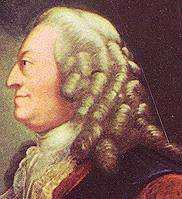
I hate painting, and poetry too!
George II (November 10 1683 – October 25 1760) was King of Great Britain and Ireland and Elector of Hanover from 1727. Born and raised in Germany, he was the last British monarch born outside Great Britain. He had poor relationships with his father and, subsequently, with his son. As king, he exercised little control over policy in Britain as the government was largely controlled by Parliament, although he was influential in foreign policy, and had far greater power in Hanover. He was the last British monarch to lead an army in battle (at Dettingen in 1743).
Quotes
- Non, j'aurai des maîtresses.
- No, I'll have mistresses.
- William M. White Emmanuel Swedenborg ([1856] 1867) vol. 2, p. 308.
- Tearfully answering his wife, Queen Caroline, who as she lay dying had urged him to marry again.
- I hate painting, and poetry too! Neither the one nor the other ever did any good.
- John Ireland Hogarth Illustrated (1791); cited from John Ireland and John Nichols Hogarth's Works (1883) p. 122.
- Later sources usually quote this as "I hate all bainters and boets!", or as "Damn the bainters and the boets too!" The saying is often misattributed to George I.
- There are kings enough in England. I am nothing there. I am old and want rest and should only go to be plagued and teased there about that Damned House of Commons.
- Statement made in Hanover (1755), quoted in Isaac Kramnick, Bolingbroke and His Circle: The Politics of Nostalgia in the Age of Walpole (Cornell University Press, 2018), pp. 113–114
- If he is mad, so much the better; and if he is mad, I hope to God he’ll bite some of my generals.
- The New-York Magazine (November 1791) p. 662.
- On being warned by the Duke of Newcastle, in 1758, against promoting James Wolfe. Often quoted as "Mad, is he? Then I hope he will bite some of my other generals."
Attributed
- Who is this Pope that I hear so much about? I cannot discover what is his merit. Why will not my subjects write in prose?
- As quoted in Sir James Prior's Life of Edmond Malone (1860), p. 369.
About George II
- He had the haughtiness of Henry the Eighth, without his spirit; the avarice of Henry the Seventh, without his exactions; the indignities of Charles the First, without his bigotry for his prerogative; the vexations of King William, with as little skill in the management of parties; and the gross gallantry of his father, without his goodnature or his honesty:– he might, perhaps, have been honest, if he had never hated his father, or had ever loved his son.
- Horace Walpole Memoirs of the Reign of King George the Second (1847) vol. 1, p. 180
External links
This article is issued from
Wikiquote.
The text is licensed under Creative
Commons - Attribution - Sharealike.
Additional terms may apply for the media files.